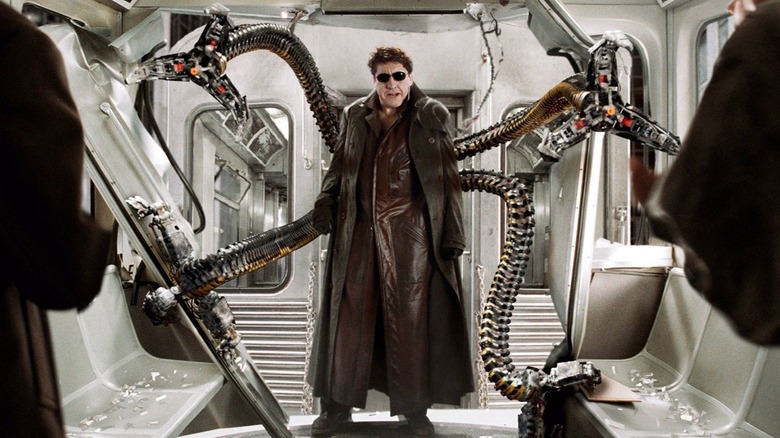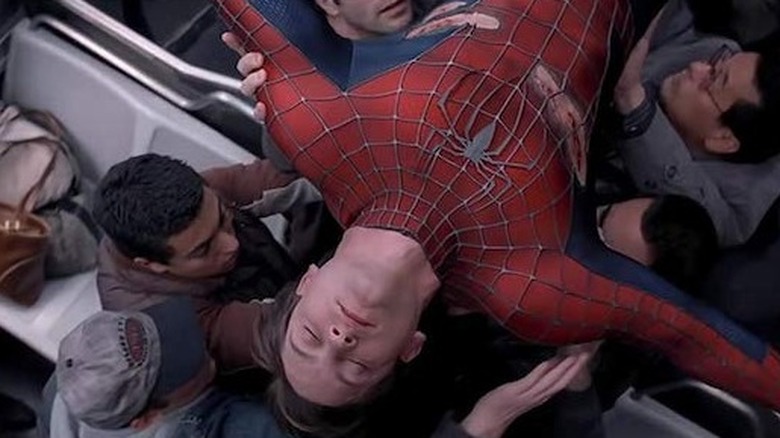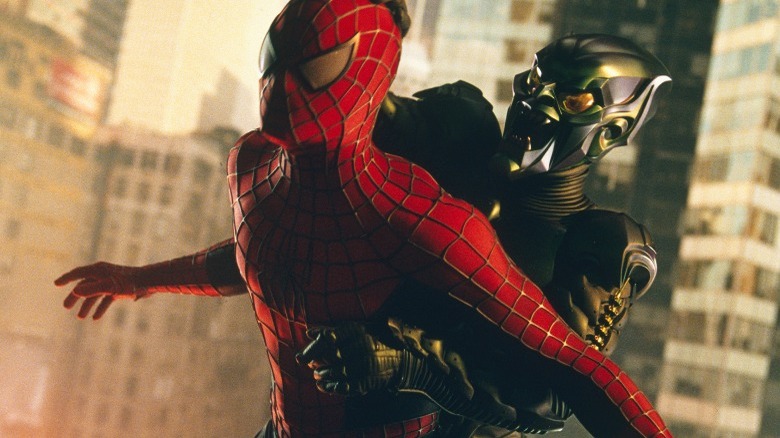Why You Should Revisit The Sam Raimi Spider-Man Trilogy
With Tom Holland's Peter Parker web-slinging his way back to theaters this weekend, it's impossible not to feel nostalgic about everything the boy hero (in all his forms) has been through. For nearly two decades now, live-action variations of Spider-Man have been saving the world and growing up in front of our eyes in the process.
What better time than now to revisit the movies that started it all? Sam Raimi's "Spider-Man" trilogy might even be better than you remembered.
Show Me A Superhero Movie As Pure As These Ones
Much has been said about where Tobey Maguire's iteration of Spider-Man stacks up against more recent portrayals, but that's the beauty of Raimi's films: when 2002's "Spider-Man" came out, there were no other big-screen portrayals. The movie was the blueprint, not only for all future Spidey stories but for the superhero movie as a genre (of which "X-Men" was also a huge influence). The Maguire "Spider-Man" films are dizzy with the possibilities of the never-before-seen, eager to dazzle audiences with big, sweeping emotional arcs and classic heroic stories. Raimi, Maguire, and the team that made "Spider-Man" couldn't have known what Marvel movies would look like in the future, but they knew that inspiring awe was central to making something like this work. Needless to say, they inspired some awe.
A sense of pure wonder and possibility is palpable throughout the Raimi "Spider-Man" films. It touches nearly every scene, from Peter and Mary Jane's (Kirsten Dunst) kiss in the rain to the heart-rending scene in "Spider-Man 2," when a train car full of strangers save a maskless Peter and vow not to reveal his identity. There's an earnestness to this trilogy that wouldn't fly today; it would likely collapse under the weight of its own self-reference.
Look high and low, and you'll find there isn't an emotional beat in these films that doesn't feel completely earned.
The Trilogy Is At Once Fantastical And Authentic
Even the overstuffed, tonally unbalanced "Spider-Man 3" is worth the rewatch. It manages to maintain the core sincerity of the first two films, but its Venom subplot is also funny as hell, in a way that's perhaps more intentional than most people gave it credit for in 2007. Try not to laugh while watching emo-coiffed Peter perform inexplicably good improvisational jazz piano. I dare you!
On a technical level, Raimi's "Spider-Man" saga also holds up better than expected. Special effects were reaching new heights but hadn't yet ventured to the uncanny valley, so scenes of soaring action could thrill audiences but also blend seamlessly with the real world of New York City. The trilogy had a significant budget, but compared to the latest "Avengers" films, they look as homemade as Peter's spray-painted Spider-Man costume. That isn't necessarily a bad thing; the texture of the films makes them incredibly easy to connect to.
Raimi's "Spider-Man" films were the first of their kind, but even with two decades of retrospect, they also feel the most true-to-life. This version of New York wasn't tied to complicated, multi-phase mythology like the one we see in current MCU movies, so it felt like a real place where maybe, just maybe, some kid really could decide to be a hero. You can recapture this feeling again and again upon rewatch, blissed out on the high of the Raimi trilogy's magic, without a care in the world about mid-credit scenes or Easter eggs.
Raimi-Verse Villains Join The MCU
By opening up the multiverse, "Spider-Man: No Way Home" will do something unprecedented, pulling the Raimi trilogy's standalone villains into a future that looks nothing like the world they know. The last time we saw mad scientist-turned-villain The Green Goblin (Willem Dafoe), he was using his final breath to ask Peter not to tell his son, Harry (James Franco), about his crimes. Doc Ock (Alfred Molina), another scientist whose robotic AI tentacles wrought unintended havoc, declared that he would "not die a monster" before letting himself fatally fall into a nuclear reactor. And Sandman (Thomas Haden Church), one of the villains of "Spider-Man 3," turned out to be both the robber who killed Peter's Uncle Ben and a pretty decent guy. In the end, Peter forgave him and he escaped with his life.
Each of these villains has something in common: dignity. They're people with the potential for goodness who were brought low by circumstance or hubris, and Raimi's films seem to care about the state of their souls as much as they care about our hero and his loved ones. Trailers have confirmed that "Spider-Man: No Way Home" is bringing all three villains back, and the footage we've seen seems to capture them in climactic moments that mirror the films they came from.
A trilogy-capping film is already high stakes by definition, but placing Tom Holland's Peter Parker in the midst of so much raw turmoil might also be dangerous for our tear ducts. The distance between 2002 Spider-Man and 2021 Spider-Man feels enormous, but if Marvel is able to cross that in a meaningful way, the emotional payoff will be unprecedented. If not, well, we'll always have the wonders of hip-thrusting emo Peter Parker to return to.
Sam Raimi's "Spider-Man" trilogy is available to stream on Peacock Premium. "Spider-Man: No Way Home" debuts in theaters on December 17, 2021.



